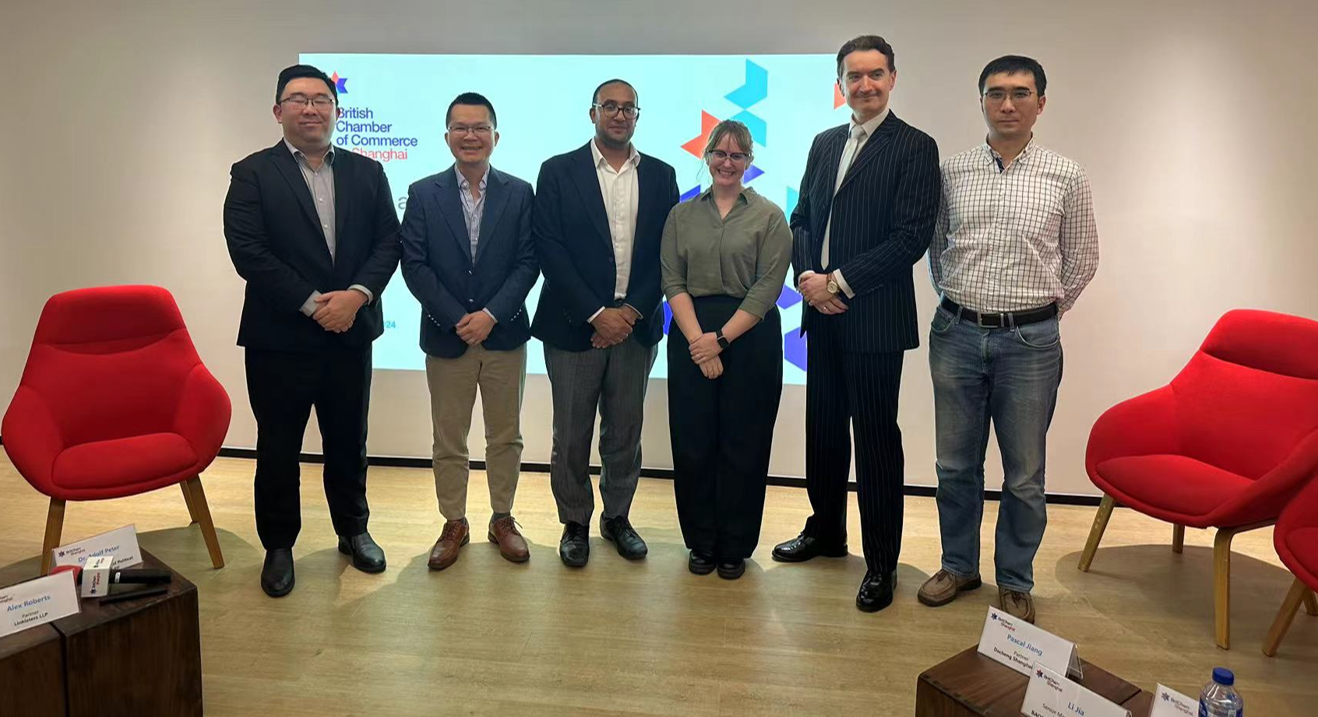On the evening of 18 June, BritCham Shanghai hosted an innovative event discussing the legal and technological aspects of AI.

The gathering began with an introduction by Dr Adolf Peter, Professor of Shanghai University of Political Law and Science, and Co-Chair of BritCham Shanghai Legal & Regulatory Committee who greeted all attendees and emphasised the importance and relevance of the topic in our increasingly AI-driven world.
Dr Adolf Peter began the event with a keynote presentation titled “The Extraterritorial Impact of the EU AI Act.” The presentation commenced with an introduction to the new EU AI Act, noting that the primary impact of these restrictions and regulations would be felt by AI technology providers. He emphasised the importance of understanding the extraterritorial impact of the Act. Following this, he defined AI as technology that operates with varying levels of autonomy, inferring from the information it receives how to generate output. He then delved into the different levels of risk associated with AI, categorising them as Low, Limited, High, and Unacceptable. Each level of risk entails specific restrictions and obligations. He concluded his presentation by stating that the most dangerous level of AI, characterised as Unacceptable due to its threat to human life, would result in fines.

Moving forward into the panel discussion, the moderator, Ms Amelia King, Director of EdTech and Innovation of Dulwich College Shanghai Puxi, provided a brief overview of the progressive and ever-changing field of AI.


Dr Adolf Peter stated that the AI Act operates on a risk-based approach and prioritises the health and safety of people. He examined how this analysis might affect AI companies and the potential political ramifications of its extraterritorial nature. Finally, he advised being vigilant as the world progresses, for example, from an electric vehicle era to an autonomous vehicle era.
Following this Mr Alex Roberts delved into the Proactive steps Chinese businesses can take to prepare for risks mitigate them. He stated the importance on data governance and recommended that intercompany and inter-sector communication was essential up to the point of having a specific committee to coordinate an approach and map out how these rules apply to the specific business.

Mr Li Jia followed by discussing the key requirements for data governance and how Chinese businesses or international businesses in China can meet these standards. He stressed the importance of data quality, noting that if the data input is of low quality, the results will be similarly poor. Additionally, he highlighted the significance of being aware of international standards for data governance.

Mr Pascal Jiang shared his observations about the contrasting focuses of AI regulations in the EU and China. In the EU, there is significant emphasis on protecting fundamental human rights when regulating new technology. In contrast, Chinese AI regulations are more focused on economic and societal improvement while preventing associated risks. He noted that generative AI system providers in China whose GenAI services involved with attribute of public opinions or social mobilization capabilities, need to pass security assessments and make the filing with the Chinese regulatory authorities.

Regarding ethics in AI, Mr Kevin Zhou stated that the rapid growth in our ability to provide products, coupled with the low level of maturity in AI governance, creates an ethical struggle for those trying to expand their business internationally. He discussed the associated risks, noting that the vast amount of data involved impacts data security. He emphasised the need to carefully protect data, including AI algorithms, inputs, and parameters. Moreover, he highlighted the importance of safeguarding personal information and operational data, which can be achieved through sound data governance and security practices.

Finally, Mr Alex Roberts added that there must be a dialogue between the data governance team and the business team to align their objectives, navigating innovation while staying within governance parameters. He concluded with the hope that AI will continue to serve as a tool rather than overtaking human control.
This event facilitated an interesting discussion and exploration of the legal and technological aspects of AI, providing attendees with insights into its relevance in the EU, UK, and China markets. We look forward to more insightful and fascinating events discussing AI and its incredibly fast and ever-changing progression in the future.